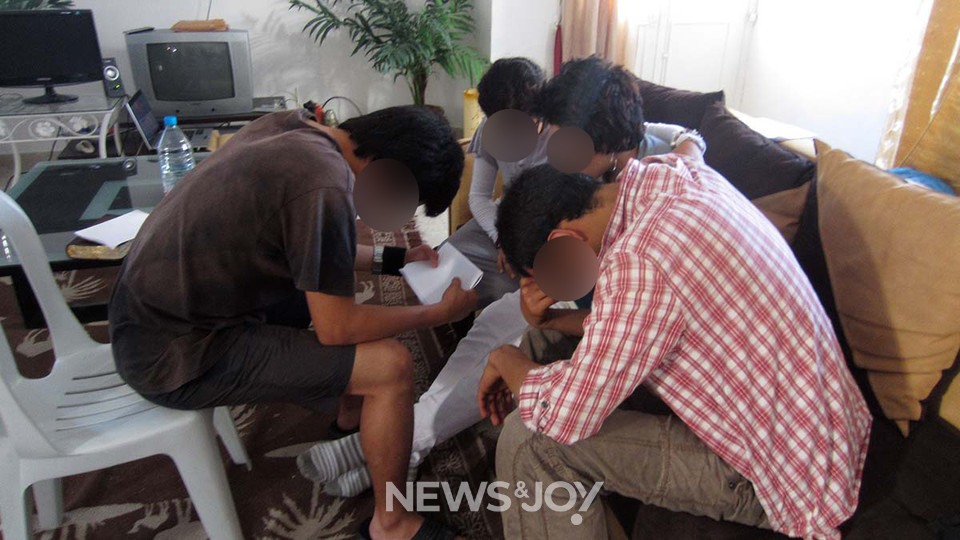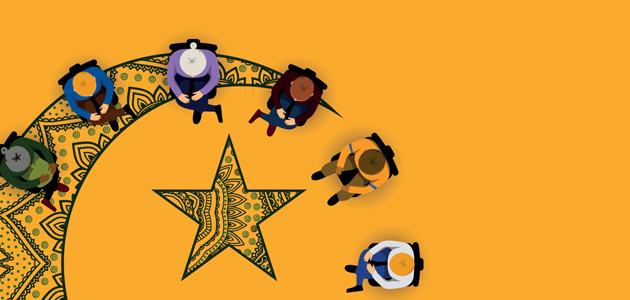This site has been archived for historical purposes. These pages are no longer being updated.
The Spiritual Exercises in Pictures
Some assistance for the composition of place
Produced in 1673 by early fathers of the Society of Jesus
and printed "chez Michel Cnobbaert, a L'enseigne de S.Pierre."
1 The origins of the Spiritual Exercises
Ignatius Loyola lived through an exciting period of history. He was contemporaneous with the Council of Trent, Thomas More, Erasmus, Luther, Calvin, Copernicus, Columbus, Magellan, Verrazzano, Cortez, Savonarola, Machiavelli, Suleiman, Henry VIII and Ivan the Terrible. During his celebrated recuperation from a battle wound Ignatius Loyola underwent a spectacular conversion. While reading about the lives of the saints, the only books available to him, he felt great consolation along with a desire to imitate these saints. At the same time he noticed that his former dreams of chivalry left him distraught. Upon reflection he gradually concluded that God was speaking to him through these feelings of serenity and agitation, and so he resolved to begin an entirely new life. Attention to these inner inspirations brought him serenity along with some surprising enlightenments which convinced him that he was directly "taught by God." He began to use his religious experiences to help others, keeping notes for that purpose and thus the Spiritual Exercises began to take form.
The Spiritual Exercises is unquestionably one of the most influential books ever created. Published some 4,500 times, an average of once a month for 400 years, the number of copies printed has been estimated to be some 4.5 million. Although it is one of the world's most famous books but also one of the least understood, it was never meant to be simply read since it is a teacher's manual and not a student's textbook. It is a how-to handbook with a set of directions for directors on how to discern amid the conflicting voices in order to hear the voice of God and to help decide how to respond amid the many options regarding what to do with one's life.
As those who try to make the Exercises alone quickly discover, the Spiritual Exercises is not a do-it-yourself book: in fact reading it unaided can be quite irritating and baffling. A director is crucial since The Spiritual Exercises are goal-orientated and require an experienced director to evaluate progress and avoid digressions. The purpose of the book is stated in the opening paragraph: "preparing and disposing our soul to rid itself of all its disordered affections and then, after their removal, of seeking and finding God's will in the ordering of our life for the salvation of our soul".
2 What are the Spiritual Exercises?
Similar to the physical exercises of running and swimming the Spiritual Exercises are meant to be exercises of the higher faculties, the intellect, the will, the memory and the imagination. They were not meant to be merely described, but performed and translated into personal activity. The book contains a series of practical instructions on methods of prayer, on ways to arrive at an unbiased decision, on explanations of a variety of meditations and contemplations, all aimed at helping the retreatant discover God's will and to carry it out with enthusiasm. The Spiritual Exercises are organized into a coherent body and the directives demand an intense personal response. There is a clear sense of practicality and purposefulness leading to a significant decision about the choice of a way of life, or if one's way of life is already determined, about its greater realization. Ignatius and his followers knew that anyone seeking God should not wait for visions, but should seek God with humility and intelligence and in this way "find God in all things".
An important attitude of a retreatant is expressed by Ignatius in his list of 20 directives (called annotations)."In these Spiritual Exercises, when seeking the Divine Will, it is much better and more advantageous that the Creator and Lord should communicate to the devout soul, inflaming it with His love and praise, and disposing it for the way in which it will be better able to serve Him in the future. Thus, the one who is giving the Exercises should not turn or incline to one side or the other, but standing in the center like a needle on a scale so as to allow the Creator to act directly with the creature, and the creature with his/her Creator and Lord." (15th annotation of the Spiritual Exercises)
The Exercises are divided into four distinct phases called "weeks". The "Principle and Foundation" at the beginning of the First Week of the Exercises addresses the ultimate purpose of life and the created universe, making retreatants realize that the goal of their lives is to live with God forever: that God is not only their creator but is to be their eternal companion. It follows then that they should use everything at their disposal to help themselves attain that end. Everything should be ordered to God's plan for them, and they should not be too quick to make life decisions until they first see if the outcome will lead them closer to what God's will is for them. There then follow considerations about the heinousness of sin and the havoc it wreaks in the individual and in society, about God's constant love, and about the urgency of turning from one's former attitudes to gratitude and love and to a more devout life.
It is never easy to find God's will, so the art of discernment of spirits is central to the Exercises. Discernment is not simply a matter of rational logic, but rather an understanding of how to read the signs of God's will. It provides needed inspiration and illumination for dealing with the daily struggle of good and evil within ourselves and in the world about us. Discernment of spirits becomes an important art for ongoing discovery and revelation, and it presumes a vibrant, enlightened affective life.
In his book THE FIRST JESUITS John O'Malley has a concise summary of the Spiritual Exercises as well as the Discernment of Spirits.
If the purpose of the First week was successfully achieved, the individuals have found a new and happier orientation at the very core of their being and is set more firmly than before on the path to salvation. . . . That continuing movement in fact constitutes the precondition for engaging in the other three Weeks.
Those Weeks were constructed with a view to confirming the First Week, while moving the person along to further issues. Was some other change, especially in the external framework of one's life or the kind of future one envisioned for oneself, possible, desirable, and now to be made? Such a change would not only deepen the original experience but would make one's life even more conformable to the life and teachings of Jesus, accepted by Ignatius without question as the best to which human beings could aspire.As was Ignatius himself at Manresa, the person making the retreat was to be ''taught by God". It was surely for this reason that the individual was to have at hand only a few books such as the Gospels. [Ignatius] warns the person guiding another in the Exercises that at the time of the election he should not try to influence the outcome one way or another, but rather "allow the Creator to deal immediately with the creature, and the creature with its Creator and Lord." This immediate action of God on the individual is the fundamental premise of the Exercises. (O'Malley, 1993, p. 39-43)The final experience of the Spiritual Exercises is the Contemplation to Attain Love. It consists of a final transition synthesizing the whole experience of the retreatant in a vision and daily way of life. For Ignatius the gift of God's love can be known in every human situation and experience. We can find in everything God working for us.
3 Why are these Exercises Relevant today?
We could ask why Ignatius Loyola is placed with all the renowned educators from Socrates to Dewey as one of the world's great innovators of education? What convinced institutions from the Sorbonne to Columbia University to engrave "Loyola" on their walls? It was because Ignatius realized that education was not an end in itself but rather a means to lead the student to care about other human beings. The genius and innovation he brought to education came from his Spiritual Exercises whose object is to free a person from biases, thus enabling one to make free choices. Based on the premise that people who are free enough to say reality is good, will recognize their own goodness and will live happy and fulfilled lives. The goals of Jesuit education have always been to offer this means to become a person of choice, thus inviting students to be more concerned about fellow human beings.
The Spiritual Exercises has never been a book meant only for professional religious. Ignatius of Loyola conducted the Exercises for 15 years before he was ordained. Thus he drew scores of men into the Company of Jesus, but drew many more women and men of all vocations to a place where they found God in their lives. It surprises no one who knows their history that the Spiritual Exercises are proving an astonishingly effective instrument of lay spirituality even in this modern era. They are being used for, by and with lay people in many formats all around the world and they supply the basis of a sophisticated spirituality for the marketplace. More people are going through the one-on-one directed Exercises today than at any time in history. Moreover The Spiritual Exercises are being used as an apostolic instrument by better-educated laity.
I have electronically reproduced these 55 pictures with their respective captions. This ancient book is part of the Jesuitana (Jesuit Collection) found in the John J. Burns Library of Boston College, and was graciously made available to me by the Burns Library director Robert O'Neill. The book has no preface nor introduction.
Joseph MacDonnell, S.J.Warning: Because of the many large images
it may take more than 60 seconds for this page to load.
Approval of the Spiritual Exercises by Pope Paul III 03 An inspired Ignatius. 04 The Foundation. 05 The Particular examen. 06 The General examen. 07 Sin of the angels. 08 Hell 09 Hell. 10 Death. 11 Judgement. 12 Hell. 13 The Prodical Son. 14 Christ the King 15 The Annunciation. 16 The Incarnation. 17 The Nativity. 18 The Two Standards. 19 The Three Classes. 20 The three degrees of Humility. 21 The Election. 22 The washing of feet. 23 The arrest in the garden. 24 The apparition to the Blessed Virgin. 25 The contempaltion to gain Love. 26 Daily meditation. 27 The Visitation. 28 The Nativity of Christ. 29 The Circumcision. 30 The Purification in the Temple. 31 The flight into Egypt. 32 The Hidden Life of Christ. 33 The Baptism of Christ. 34 Asking for bread and receiving a stone. 35 The Call of the Apostles 36 The wedding feast at Cana 37 The sermon on the mount. 38 Christ walking on water. 39 Palm Sunday. 40 The Last Supper. 41 The agony in the garden. 42 Christ before the Sanhedron. 43 Trial before Caiaphas. 44 The flagelation. 45 The Crowning with thorns. 46 Behold the man!. 47 The way of the cross. 48 The crucifixion. 49 The burial of Christ. 50 The Resurrection. 51 The Lord appeared to Mary Magdelane 52 Apparition on the way to Emmaus. 53 The Lord appeared to Thomas 54 The ascension. 55 The Contempaltion to gain Love. 56 Indulgence for the Spiritual Exercises
granted by Pope Alexander VII.Return to Home Page

 <회복적 정의의 정치학 - 회복적 정의는 사회를 어떻게 변혁하는가?> / 앤드류 울포드·아만다 네룬드 지음 / 김복기·고학준 옮김 / 대장간 펴냄 / 384쪽 / 2만 5000원
<회복적 정의의 정치학 - 회복적 정의는 사회를 어떻게 변혁하는가?> / 앤드류 울포드·아만다 네룬드 지음 / 김복기·고학준 옮김 / 대장간 펴냄 / 384쪽 / 2만 5000원 김복기 목사. 줌 화면 갈무리
김복기 목사. 줌 화면 갈무리 고학준 팀장. 줌 화면 갈무리
고학준 팀장. 줌 화면 갈무리 김민혁 씨(맨 왼쪽·가명)는 20대 초반 튀지니로 선교를 떠나 아랍어를 익혔다. 사진 제공 김민혁
김민혁 씨(맨 왼쪽·가명)는 20대 초반 튀지니로 선교를 떠나 아랍어를 익혔다. 사진 제공 김민혁 김민혁 씨(맨 오른쪽)는
김민혁 씨(맨 오른쪽)는 

